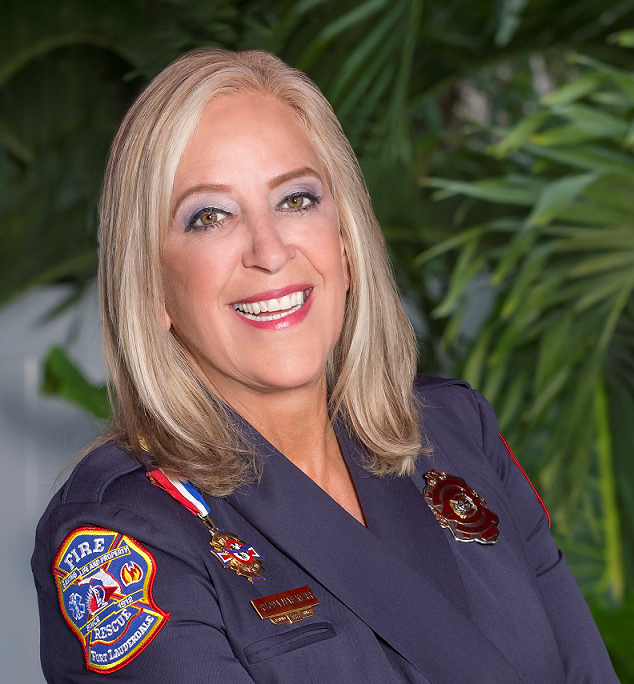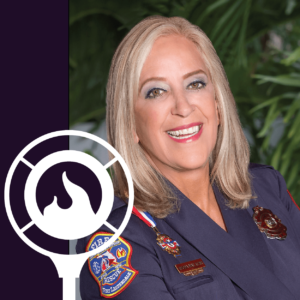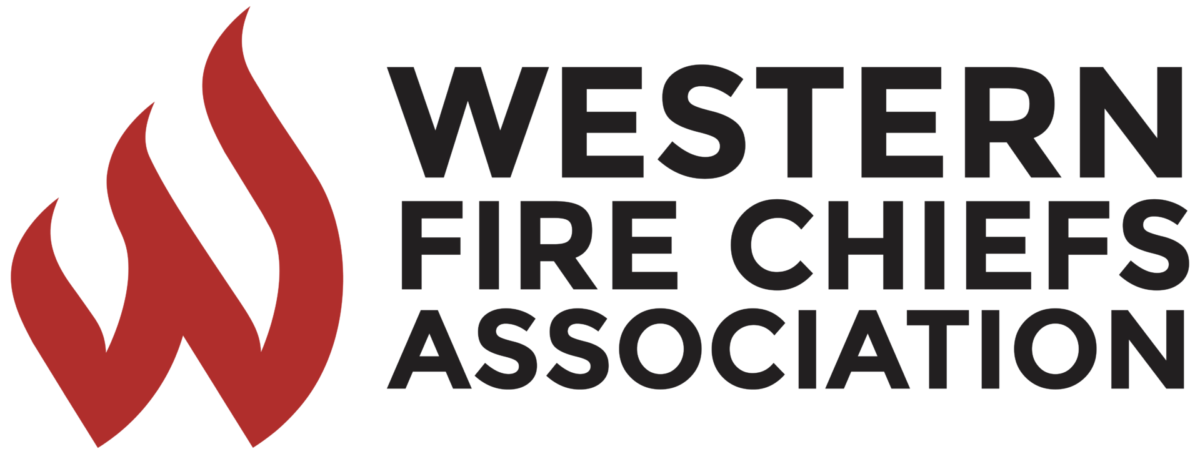E4: Standing Up & Standing Out, Inclusive Leadership w/ Rhoda Mae Kerr
February 1, 2021

Chief Rhoda Mae Kerr is a fourth generation firefighter who has achieved numerous ‘firsts’ in her nearly 40-year career. Not only has she served as the first female Fire Chief in more than one department, she served as the President of the International Association of Fire Chiefs (IAFC) in 2015, the first woman to do so in the Association’s 148-year history. Chief Kerr joins us to discuss her journey, the importance of leading by example, and how fire service leaders can foster inclusion within their departments.
No time to listen to the whole episode? View our show notes summary below:
E4 Show Notes

Fire Rescue Chief Rhoda Mae Kerr
Fort Lauderdale, Flordia
https://www.fortlauderdale.gov/
http://www.rhodamaekerr.com/
Rhoda Mae Kerr was sworn in as the City of Fort Lauderdale Fire Rescue Chief on July 2, 2018, becoming the City’s first female Fire Chief in the 106-year history of the department. Chief Kerr brings almost 40 years of experience to her position where she oversees a staff of almost 500 professional firefighters, ocean-rescue lifeguards, and administrative personnel. The department responds to more than calls annually.
Chief Kerr has been a trailblazer in the fire profession for decades. In 2015, she was the first woman elected President of the International Association of Fire Chiefs (IAFC) in the 142-year history of the organization. She served as President of the Metropolitan “Metro” Fire Chiefs Association from 2016 - 2017 and is a former President of the National Society of Executive Fire Officers (NSEFO).
Excerpts:
A Challenging Career with Upward Mobility: How Chief Kerr Started in the Fire Service
• “My decision was that, if I was gonna to do this, I was gonna do it and, being one of a few women in the fire service […] in the country, I was going to be sure I excelled in every aspect and I wasn’t the last person to finish the run, or the last person to be able to grasp an idea or a task. I worked really hard finishing at the top of my class, making sure I represented the women of the world well.” [2:04]
• “Any time an opportunity came along to do something, I always said yes. Even though, like everybody else, you want to stay in operations because it’s the most fun… if you really want to be a Fire Chief, then you have got to experience every aspect of the fire service that there is... You have to be willing to move and to experience everything, take every opportunity that you absolutely can so that when it’s your turn to be at the top you have that broad range of experience, and then you can rely upon that experience to help you make things better.” [3:00]
• “One of [my mentors] was the former Fire Chief here in Fort Lauderdale, Otis Latin… he was the person that encouraged me and taught me how important it was to have the diversification […] and gave me opportunities to move around in the organization.” [5:04]
More than ‘Keeping Safe’: Taking Care of Personnel and Community
• “I think that it’s not only keeping them safe but taking the very best care I can of [my personnel], and my number two priority is always providing the best service we can to the community. So if I don’t do number one, I can’t do number two, but part of that number one is not only making sure to provide the very best equipment… but also accountability and responsibility… That’s only fair to everybody else in the organization. If somebody isn’t doing the right thing and they aren’t following the rules and regulations […] or the policies, then I hold people accountable for that.” [7:42]
• “Because [fire service members] work together as teams, and when they don’t have trust and they don’t have faith and they don’t believe in [someone] like they should, and they don’t know what to expect sometimes from that person, [allowing one person to behave poorly is] not fair to everybody else.” [9:13]
Pink is the New Red
• “Even though it seems like a small thing, that just has given the department some pride, I was able to wrap one of our firetrucks pink. It is in honor of all those who have won the battle and those who have lost the battle… it’s a reserve truck so it’s all over the city, and I wondered if maybe the firefighters, the men, we're going to go ‘Oh, pink fire truck really? That’s what we get when we have a woman Chief?’ But they all really love it. They go ‘Everybody is beeping at us, waving at us, wanting us to stop so they can take pictures!’ It was just a good morale booster and it’s fun.” [12:02]
Lessons from the IAFC Presidency
• “In some ways nothing is different, no matter where you are in the world, when it comes to the fire service. Firefighters are truly the same caring, dedicated, committed people no matter where and no matter what equipment they have, or what they don’t have. I remember being in Guam and Saipan, and we went by a fire station that the building itself was just a small concrete block building, and the engine room was […] just a metal covering, and it was a dirt floor. But those firefighters love what they do… you can see the pride.” [15:23]
• “Being the first woman President, a lot of these departments and cities and organizations that I did get to interact with weren’t used to seeing a woman in charge. They had no women in their department[s]… so I think it was a great example for them.” [16:30]
Ways to Make Your Department More Inclusive [23:56]
• Policies & Procedures: “Recognize that there are different types of people in the workforce.”
• Bathrooms: “It’s not just women that don’t want to be in a big shower room… there might be some men who are just not comfortable in that environment.”
• Uniforms: “I can tell you even to this day not all uniforms fit women.”
• Recruitment & Outreach: “You have to show that your department wants [diversity].” “I’m working on hiring a new cadet class, and we’re going to do a mentor program, and from the time the person is on the list […] we are going to assign [a mentor] to that person. So, they’ll be calling [the recruit] and saying ‘Hey, we’re not hiring yet, but maybe you’d like to come out and do a ride-along’… and once they are hired, [the mentor] is constantly in touch with [the recruit] to make sure they are ok and that they are successful.” [25:32]
Standing Up and Standing Out, With Help
• “With […] recognition comes, sometimes, exclusion. And people go ‘Yeah they just got that because they’re […] a woman’, or ‘They just got that because they’re black’, or some other comment, and ‘It’s not any different than what I do every day’. But it is a little different; you’ve succeeded in a world where you haven’t been for 100 years… I think if more people are comfortable and celebrate those successes then the less it becomes a big deal… If we don’t celebrate those successes and we don’t challenge our people to accept that, then it’s not going to get better. It only gets better when we recognize it and other people see it.” [27:11]
• “Make sure you build good relationships everywhere you can and anywhere you can, and not necessarily just within the fire service… In the City of Fort Lauderdale, we have a great relationship with our Public Works Department and our Parks and Recreation Department. When we were going through the early stages of COVID and we did not have sufficient masks […] we were doing everything you could to make them last longer… The Public Works Department, the engineers, created a sanitizing box that would sanitize the masks and extend their wear time, and then the Parks and Rec Department built them for us.” [29:13]
• “You have to be what you want your people to be. It’s right back to setting that shining example. It’s so important that we live our lives showing what we [the fire service] need to be and who they [(our personnel)] need to be.” [31:55]
Notable:
“Diversity in all of its forms is really important to the success of an organization, whether it’s a fire department, whether it’s a Fortune 500 company, no matter where it is or what it is, it’s important that we represent the people that we serve... Our bottom line is our citizens and what they think of us… during tough times you need the support of your community that says ‘No, we’re not closing the fire station’ or, ‘We’re not downsizing our firefighters,’ but they only do that because you have proven to them that you represent them and you are there for them.” [17:38]

